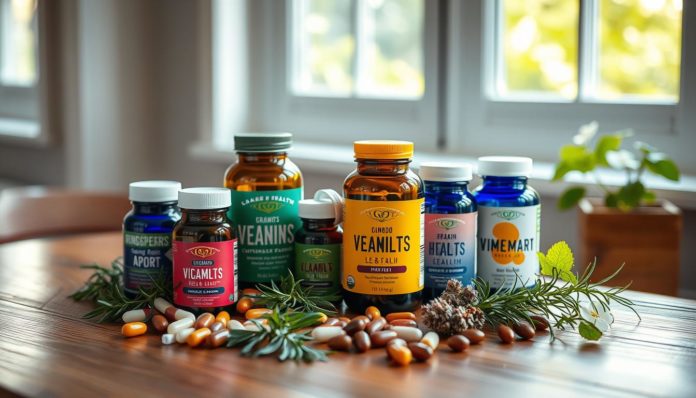Right now, 5.8 million people in the United States live with Alzheimer’s. This number might triple by 2060. An interesting link between Alzheimer’s and nutrition has been found. It shows how a diet full of nutrients can help brain health.
No vitamin or supplement has been proven to stop Alzheimer’s yet. But, nutrients like antioxidants might protect cells from harm. Studies on things like resveratrol are interesting, but we need more research. Always talk to a doctor before taking any supplements for Alzheimer’s. This helps prevent bad reactions with other medicines.
Introduction to Alzheimer’s and Nutritional Support
Alzheimer’s disease is a condition that affects the brain, leading to memory and thinking problems. It makes people look at nutritional support to help manage the disease. Eating foods and taking supplements that are good for the brain might help slow down the disease.
While no cure exists for Alzheimer’s yet, proper nutrition can help support the body. Here are important points for following an Alzheimer’s diet:
- A balanced diet is crucial for brain health.
- Foods high in antioxidants, omega-3s, and vitamins D and E are beneficial.
- Herbal supplements and natural remedies might also help.

Research shows how diet plays a role in Alzheimer’s. Here’s a table with key nutrients and how they help the brain:
| Nutrient | Role in Brain Health | Common Sources |
|---|---|---|
| Omega-3 Fatty Acids | Supports cognitive function and reduces inflammation | Fish, flaxseeds, chia seeds |
| Vitamin D | Regulates brain function and lowers cognitive decline risk | Sunlight, fortified dairy, fatty fish |
| Antioxidants | Protects brain cells from damage | Berries, nuts, dark chocolate |
The Role of Antioxidants in Brain Health
More people are learning about brain health supplements, focusing on antioxidants. These antioxidants guard our cells against harm caused by free radicals. If we don’t handle this stress, it could harm our brain and lead to diseases like Alzheimer’s.
What Are Antioxidants?
Antioxidants are special compounds that fight the stress caused by free radicals. These unstable molecules can damage cells. Vitamins like beta-carotene, C, and E are key antioxidants. They help keep our brains and bodies healthy.
Common Sources of Antioxidants
Eating lots of plant foods is a great way to get antioxidants. Here are some top sources:

- Berries: Blueberries, strawberries, and raspberries are full of antioxidants. They’re great for brain health.
- Tea: Green and black teas have lots of antioxidants. They help our brains stay sharp.
- Leafy Greens: Foods like spinach and kale have loads of important antioxidants.
Antioxidants and Alzheimer’s
Research shows that people with Alzheimer’s have high levels of oxidative stress. Antioxidants could help lower this stress. Supplements with antioxidants might benefit the brain. But, eating natural foods like berries and tea is better. More studies are needed to prove if they can prevent or treat Alzheimer’s.
| Source | Type of Antioxidant | Potential Benefits |
|---|---|---|
| Berries | Polyphenols | Protect against cognitive decline |
| Tea | Flavonoids | Support brain health and reduce free radical damage |
Omega-3 Fatty Acids: Benefits for Cognitive Health
Omega-3 fatty acids are key for brain health. They have components called DHA and EPA. Eating foods rich in omega-3s helps boost cognitive function and protects brain cells.
Sources of Omega-3 Fatty Acids
You can find omega-3 fatty acids in many foods. Fatty fish like salmon, mackerel, and sardines are great sources. So are nuts and seeds, including walnuts and flaxseeds. Adding these to your diet is crucial for Omega-3 daily intake.
Research on Omega-3s and Alzheimer’s
Research has looked into omega-3 fatty acids and Alzheimer’s disease. Some studies show DHA and EPA might slow Alzheimer’s progress. But, we still need more proof. Even so, omega-3s support brain cell protection and memory function.
Recommended Dosages
The FDA suggests limiting Omega-3 daily intake to 3 grams. Only 2 grams should come from supplements. This ensures you get omega-3s’ benefits safely.
Vitamin D and Alzheimer’s Disease
Vitamin D is crucial for brain health. It has drawn attention for its role in Alzheimer’s disease risk. Experts say it’s vital for the brain.
The Importance of Vitamin D
The “sunshine vitamin,” vitamin D, comes from sunlight on our skin. It’s key not just for bones but also the brain. You can find it in fatty fish, egg yolks, and certain fortified foods.
Research Findings
Studies link low vitamin D levels to a higher Alzheimer’s risk. Though the direct link isn’t proven, higher vitamin D might reduce this risk. The Alzheimer’s Drug Discovery Foundation is exploring its potential benefits more.
Safe Supplementation Practices
Sunlight is a natural vitamin D source, but supplements are an alternative. It’s crucial to get the right dose. Always talk to a healthcare provider for advice. Below is a basic guide:
| Source | Recommended Intake |
|---|---|
| Sunlight Exposure | About 10-30 minutes several times per week |
| Food Sources | Fatty fish, egg yolks, fortified dairy |
| Vitamin D Supplementation | Generally 600-800 IU daily for adults |
Exploring the Benefits of Vitamin E
Vitamin E is known for being a strong antioxidant. It protects cells from damage. This is key in the fight against Alzheimer’s. Studies are looking into how vitamin E might help.
Many healthy diets include foods rich in vitamin E. Yet, its true effect on Alzheimer’s is still being researched. People should be careful with antioxidant supplements. More evidence is needed to prove they help with Alzheimer’s.
Some studies show vitamin E could protect our brains. But, we need more research to be sure. It’s important to keep up with new findings. We need to make informed decisions about our brain health and handling Alzheimer’s. The field is growing, so we must stay cautious and informed.
B Vitamins and Cognitive Function
B vitamins are key for brain health, especially in controlling homocysteine levels. High levels of homocysteine can harm cognitive abilities. Folic acid, B6, and B12 are very important for fighting Alzheimer’s. They help a lot in keeping the mind sharp.
Types of B Vitamins Crucial for Brain Health
The most important B vitamins for the brain are:
- Folic Acid (Vitamin B9)
- Vitamin B6 (Pyridoxine)
- Vitamin B12 (Cobalamin)
These vitamins work together to lower homocysteine levels. Keeping these levels low is crucial because high levels can lead to cognitive problems.
Studies Linking B Vitamins to Alzheimer’s
Recent studies show that taking more folate lowers the risk of dementia. A review found that B vitamins can slow the brain’s aging process. They decrease the chance of getting dementia, especially if taken early and for a long time. But, taking more B12 and B6 may not have the same effect.
Recommended Intake and Supplementation
It’s best to get B-vitamins from food. But, older adults and those with Alzheimer’s might need supplements. Below is a guide for daily vitamin intake:
| B Vitamin | Recommended Daily Allowance |
|---|---|
| Folic Acid (B9) | 400 mcg |
| Vitamin B6 | 1.7 mg |
| Vitamin B12 | 2.4 mcg |
Talk to a doctor before starting any supplements for brain health. Everyone’s health is different, and a doctor can offer the best advice.
The Role of Coenzyme Q10 in Brain Health
Coenzyme Q10, also known as CoQ10, is an antioxidant our bodies make. It’s crucial for mitochondrial function and keeping cells powered. This is vital for our overall well-being.
Understanding Coenzyme Q10
Coenzyme Q10 helps reduce oxidative stress. This keeps our antioxidant defense strong. It’s believed to support brain health and help those with memory issues.
Potential Benefits for Alzheimer’s Patients
Studies on Coenzyme Q10 and brain health are ongoing. Early results show it may guard against memory loss by aiding mitochondrial function. This is hopeful news for those with Alzheimer’s, as the disease often harms mitochondria.
Dosage and Safety Considerations
The right Coenzyme Q10 dosage is key. Dosages vary from 30 to 200 mg daily. Sometimes, doctors suggest more, but under close watch. While it’s usually safe, always talk to a doctor before starting, especially for large doses.
| Benefit | Description |
|---|---|
| Antioxidant Defense | Protects cells from oxidative stress |
| Mitochondrial Function | Supports cellular energy production |
| Cognitive Health | Potentially beneficial for brain health |
Gingko Biloba and Memory Support
Gingko Biloba has long been linked to better memory and brain function. For centuries, it’s been a key part of traditional medicine. People praise it for its ability to fight off cognitive decline.
However, recent big studies have not shown it can prevent or slow down Alzheimer’s disease. Even though it has antioxidant properties, they haven’t led to clear benefits for Alzheimer’s patients.
Many people take Gingko Biloba hoping to avoid losing their memory. But based on current research, although Gingko Biloba might help with memory, it’s not proven to affect Alzheimer’s. So, we can’t fully recommend it for this purpose.
Natural Remedies and Alternative Therapies
Looking into natural remedies and alternative therapies can help support brain health. This is especially important for those facing Alzheimer’s. These treatments might provide new ways to feed brain cells. They could also improve brain function and protect nerve cells.
Caprylic Acid and Coconut Oil
Caprylic acid comes from coconut or palm kernel oil. It’s an interesting subject for research. When made into a medical food called Axona, it helps Alzheimer’s patients by giving brain cells another way to get energy.
The breakdown of caprylic acid leads to ketone bodies. These can be used by brain cells for energy. Early studies showed promise for Ketasyn, which led to Axona. But, without final Phase 3 trials, we can’t fully support its use.
Thoughts on Huperzine A
Huperzine A is a cholinesterase inhibitor from a type of moss. It could help protect nerve cells by preventing the breakdown of a key neurotransmitter. This substance is crucial for memory and learning. Yet, there’s a short supply of solid studies proving it works, so we need to be careful.
The Effectiveness of Phosphatidylserine
Phosphatidylserine (PS) is a fat-soluble component crucial for brain cell membranes. It plays an important role in keeping cells working right. PS is known for aiding cognitive health and safeguarding nerve cells.
But, as with Huperzine A, we need more evidence to confidently state its benefits for Alzheimer’s patients.
| Remedy | Potential Benefit | Current Limitations |
|---|---|---|
| Caprylic Acid (Axona) | Alternative energy sources for brain cells, ketone bodies production | Lack of conclusive Phase 3 trials |
| Huperzine A | Cholinesterase inhibitors, nerve cell protection | Limited robust clinical trials |
| Phosphatidylserine | Supports cognitive health, nerve cell protection | Need for more substantial clinical evidence |
Safety Concerns and Consulting Your Doctor
When looking into vitamins and supplements for Alzheimer’s disease, safety is key. The effectiveness and safety of these supplements aren’t always certain. This is because they don’t go through the strict tests that the FDA requires. There are worries about their purity and how they might react with other medicines. So, being cautious with supplements is very important to stay safe.
It’s a good idea to talk to your doctor before starting any supplements. This is crucial since some supplements could affect Alzheimer’s medications in unexpected ways. Your doctor can look at your health needs and the medicines you’re using. Then, they can suggest the right supplements, if needed. This ensures your treatment plan is safe and right for you.
To sum up, supplements could help with Alzheimer’s, but safe use is a must. Getting advice from your healthcare provider is wise. They can offer guidance tailored to your health situation and current treatments. This careful step helps you get the best care. It also helps avoid problems from taking supplements that haven’t been checked properly.
FAQ
What Are Antioxidants?
Antioxidants guard our cells against damage from free radicals. This oxidative stress can hurt our brains. Foods like fruits and veggies contain antioxidants, such as beta-carotene, vitamins C, and E. They are key for brain health.
What Are Common Sources of Antioxidants?
You can find antioxidants in berries, tea, citrus fruits, nuts, and greens. These foods keep cells healthy and support your brain.
What Is the Connection Between Antioxidants and Alzheimer’s?
People with Alzheimer’s show high oxidative stress. This hints that antioxidants could help them. Yet, food-based antioxidants are best. We need more studies to show if they truly prevent or treat Alzheimer’s.
What Are Good Sources of Omega-3 Fatty Acids?
Oily fish like salmon and mackerel are rich in omega-3s. So are nuts and seeds. These fats help your brain cells and thinking skills.
What Does Research Say About Omega-3s and Alzheimer’s?
Research suggests omega-3s might lower dementia risks and aid brain health. This is especially true for people without a certain gene. But, more studies are needed for a clear view.
How Much Omega-3 Should I Take Daily?
The FDA suggests no more than 3 grams of omega-3s daily. Supplements should not exceed 2 grams. Always ask a healthcare provider for advice tailored to you.
Why Is Vitamin D Important for Alzheimer’s Patients?
Vitamin D supports brain function and health. Low vitamin D levels are common in those with Alzheimer’s. More vitamin D, from the sun, foods, or supplements, might help.
What Are Safe Supplementation Practices for Vitamin D?
A healthcare professional can advise on safe vitamin D supplementation. You can get it from the sun, oily fish, eggs, fortified foods, or supplements.
What Are the Benefits of Vitamin E for Cognitive Health?
Vitamin E, an antioxidant, might defend against Alzheimer’s-related cell damage. Yet, we need more evidence on vitamin E and Alzheimer’s treatment.
Which B Vitamins Are Crucial for Brain Health?
B vitamins like folic acid, B6, and B12 are crucial. They lower homocysteine, which might cut the risk of Alzheimer’s and brain issues.
What Does Research Say About B Vitamins and Alzheimer’s?
Some studies show B vitamins could boost brain functions. This might help those facing Alzheimer’s. More research is needed to confirm these findings.
How Much Coenzyme Q10 Should I Take?
Talk to a healthcare provider about Coenzyme Q10 doses. While promising for the brain, too much can be harmful. Doses can vary based on individual needs.
Is Gingko Biloba Effective for Memory Support in Alzheimer’s?
Although used traditionally and loaded with antioxidants, Gingko Biloba hasn’t proven effective in major studies for Alzheimer’s. It’s not recommended based on current science.
What Are Some Natural Remedies and Alternative Therapies for Alzheimer’s?
Some explore caprylic acid, Huperzine A, and Phosphatidylserine for Alzheimer’s. They may offer benefits, but strong clinical evidence is missing. Consult a healthcare provider before trying these remedies.
Why Is It Important to Consult My Doctor Before Taking Supplements?
Talking to a healthcare provider ensures supplements are safe with your medications. This careful step guides wise choices for Alzheimer’s care and management.


